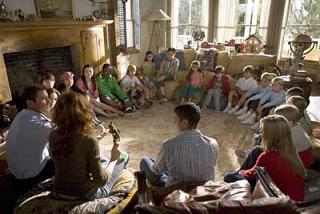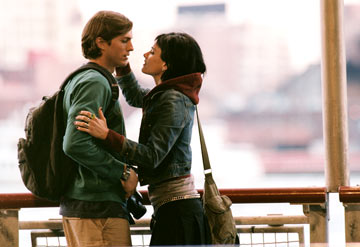
[starttext]
As remakes go, Yours, Mine, and Ours is pretty unnecessary. The original 1968 version starred Henry Fonda and Lucille Ball. The remake has Dennis Quaid, Rene Russo, and eighteen bright looking kids out for contrived family fun. Two high school sweethearts, Frank Beardsley (Quaid, Flight of the Phoenix, In Good Company) and Helen North (Russo, Two for the Money, Big Trouble) reconnect after years apart. Beardsley is a type A personality. He runs the Naval Academy, and his wife died, leaving him in charge of the eight kids. North is the opposite. Her husband died, leaving her with four children and six adopted kids (a veritable United Nations). She is a free spirit, who believes in art, and touchy-feely things. In other words, they are exact opposites and will fall madly in love with each other.
The problem with Yours, Mine, and Ours is that director Raja Gosnell (Scooby-Doo 2: Monsters Unleashed, Scooby-Doo) is that everything feels a bit too fake. This is the type of movie engineered by committee for broad family appeal. There's slapstick comedy, a good moral, and really not much that is objectionable. Well, except for the basic plot point - kids teaming up to break up their parents. Sure, it's blatantly obvious that they will learn from their mistakes, but sheesh, this is pretty bad. Screenwriters Ron Burch and David Kidd (Head Over Heels) are counting on things like food fights and progressively worse bickering to generate laughs. Heck, there's even a pig thrown in for good measure.
Once the Beardsley's and the Norths move in together, all hell breaks look. Frank runs his family like the military. They march, they follow orders, and they do everything except act like real kids. Helen's family is pure chaos. Of course, once Frank assigns rooms, each has a Beardsley and North, causing mass hijinks. Nobody gets along, and Frank and Helen have opposite ways in which they want to discipline their new family. William (Sean Faris, Sleepover, Pearl Harbor), the oldest, realizes that the only way to get things back to normal is to break up their parents. This means getting Frank and Helen to fight.
It's not a real stretch to see where things go from here. Frank and Helen bicker, and the children begin to bond. By the time Frank and Helen are ready to truly split, the kids realize they enjoy each other's company. Again, purely artificial. The real wonder is that Gosnell actually manages to squeeze some emotion into the end of the story. Probably because he was willing to sink the story so low that it was nice to see good things happen to the children. But Yours, Mine, and Ours still maintains a large sense of artificiality. Frank and Helen marry after seeing each other again twice. Yes, they had some relationship in high school, but by not explaining what happened and then having the two jump into a marriage, Gosnell makes them seem pretty stupid.
The problem with Yours, Mine, and Ours is that director Raja Gosnell (Scooby-Doo 2: Monsters Unleashed, Scooby-Doo) is that everything feels a bit too fake. This is the type of movie engineered by committee for broad family appeal. There's slapstick comedy, a good moral, and really not much that is objectionable. Well, except for the basic plot point - kids teaming up to break up their parents. Sure, it's blatantly obvious that they will learn from their mistakes, but sheesh, this is pretty bad. Screenwriters Ron Burch and David Kidd (Head Over Heels) are counting on things like food fights and progressively worse bickering to generate laughs. Heck, there's even a pig thrown in for good measure.
Once the Beardsley's and the Norths move in together, all hell breaks look. Frank runs his family like the military. They march, they follow orders, and they do everything except act like real kids. Helen's family is pure chaos. Of course, once Frank assigns rooms, each has a Beardsley and North, causing mass hijinks. Nobody gets along, and Frank and Helen have opposite ways in which they want to discipline their new family. William (Sean Faris, Sleepover, Pearl Harbor), the oldest, realizes that the only way to get things back to normal is to break up their parents. This means getting Frank and Helen to fight.
It's not a real stretch to see where things go from here. Frank and Helen bicker, and the children begin to bond. By the time Frank and Helen are ready to truly split, the kids realize they enjoy each other's company. Again, purely artificial. The real wonder is that Gosnell actually manages to squeeze some emotion into the end of the story. Probably because he was willing to sink the story so low that it was nice to see good things happen to the children. But Yours, Mine, and Ours still maintains a large sense of artificiality. Frank and Helen marry after seeing each other again twice. Yes, they had some relationship in high school, but by not explaining what happened and then having the two jump into a marriage, Gosnell makes them seem pretty stupid.
